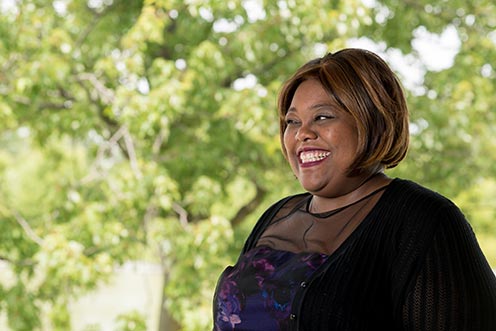Successful Outcomes
Nestelynn was in the prime of her life when she was diagnosed with a glioma in the frontal lobe of her brain. DNA from her tumor revealed that with surgery, her tumor was curable.
Life with a brain tumor goes far beyond scans and surgery. At the Hermelin Brain Tumor Center, we understand that meeting both your physical and emotional needs is key to your long-term well-being.
Each person’s needs are different, and our team works with you to develop a personalized treatment plan. We help you live a productive life focused on the areas that mean the most to you.
You can call the Hermelin Brain Tumor Center anytime at (313) 916-2723.
We know you will likely have lots of questions and concerns, such as:
Our team can answer any questions or concerns you and your loved ones may have. Remember that this will be a journey filled with uncertainty. There is so much to learn and understand. It is important to keep a positive outlook despite any setbacks.

Nestelynn was in the prime of her life when she was diagnosed with a glioma in the frontal lobe of her brain. DNA from her tumor revealed that with surgery, her tumor was curable.
It’s important that you understand your brain tumor diagnosis and treatment options. Many people have benign (noncancerous) brain tumors, which are very treatable. For those with malignant brain tumors, life is now more hopeful, thanks to treatment advances. Many brain cancer patients are measuring their survival in years.
At our center, every effort is made to pursue aggressive therapy while minimizing side effects, so you can achieve the highest quality of life with brain cancer. We offer a comprehensive, multidisciplinary approach with superior access and convenience. Our program includes:
As you prepare for your first appointment, you may want to consider discussing these topics with your doctor:
Unfortunately, most gliomas come back at some point . At Henry Ford, we take a personalized approach to treating the tumor in your brain. Each person experiences different symptoms based on the location of the brain tumor, as well as its size and type. Each person also reacts differently to treatments such as chemotherapy and radiation therapy.
It is important to keep in touch with your nurses and doctors if you start to act or feel differently, including if you have symptoms such as:
We use cookies to improve your website experience. By using this site, you agree to our Terms of Use. Read our Internet Privacy Statement to learn what information we collect and how we use it.